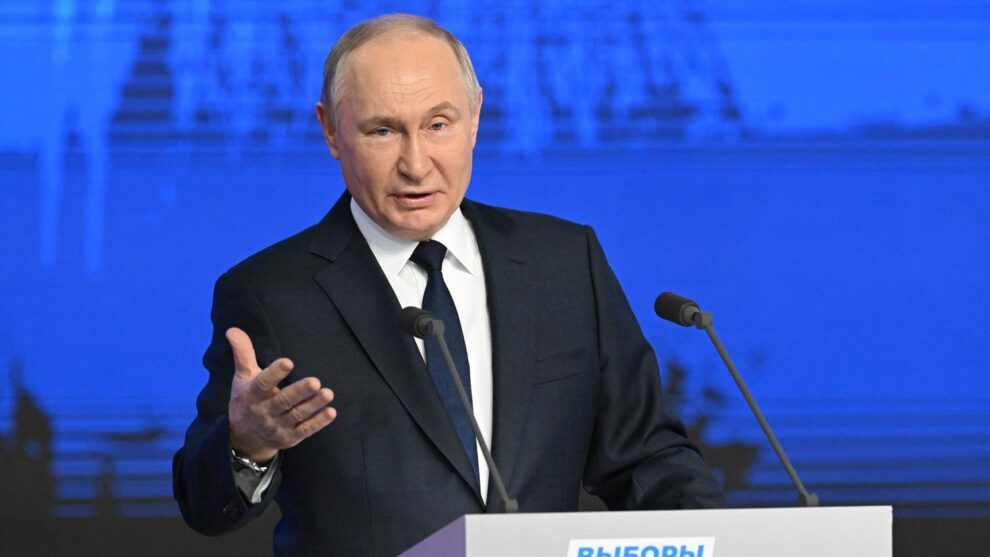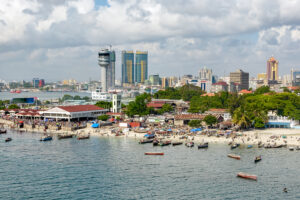This month’s vote will be the first conducted while Russia is involved in a major war, and Vladimir Putin is counting on a strong show of national unity and highlighting support in occupied Ukraine.
The results of the March 15–17 vote are not in doubt, so what’s at stake for President Vladimir Putin in this election?
Just winning has never been enough for Putin. He must win in a fashion that demonstrates that he remains the master of the Russian political system. And that means mobilizing the elites, including the upper levels of the federal bureaucracy and regional leaders, to produce a robust turnout and an overwhelming share of the vote for him with minimal fraud.
Achieving this result could appear easy in an authoritarian system like Russia’s. It isn’t. The challenge is persuading the public to turn out in what is essentially an uncontested election to show their support for Putin and his policies. The Kremlin has been actively preparing for the election for the greater part of the past year, developing themes and showcasing Putin to try to arouse popular enthusiasm. If the past is any guide, it has also tasked leaders of Russia’s eighty-nine regions, districts, republics, and federal cities with meeting certain marks (probably in the 70–80 percent range) for turnout and Putin’s share of the vote—with the leaders’ understanding that failing to reach them could bring an abrupt end to their political careers. If all goes as planned, as it has in previous votes, the election will highlight Putin’s deep support within the elites and the elite’s ability to mobilize the people for state purposes.
Such a result is particularly important in this electoral cycle, the first one ever carried out while Russia is engaged in a major war. A resounding show of national unity behind Putin’s war effort would further bolster his legitimacy while standing in sharp contrast to Ukraine’s anxiety about the battlefield situation and the West’s mounting fatigue over supporting the war. The Kremlin will also seek to highlight a strong showing in the five occupied Ukrainian provinces as further evidence of the population’s deep satisfaction with being reunited with Russia.
What are the government’s biggest concerns now that it is seeing war advances in Ukraine, a possible slackening of Western resolve, and its loudest critic, Alexei Navalny, has just been buried?
Putin exuded great confidence as he delivered the Russian equivalent of the State of the Union address on February 29. He praised the resilience and unity of the Russian people in the ongoing fight in Ukraine, which he still calls a “special military operation,” not a war, and in meeting the broader challenge from the West, which he insisted was intent on dismantling the Russian state. The hybrid war with the West, he implied, would be the dominant feature of his next six-year term as president. Meeting that challenge is the Kremlin’s main concern.
To sharpen Russia’s competitive edge, Putin announced five new national projects focused on family, health, education, big data, and technology. While the programs are new, the areas of concern are long-standing. Efforts to stem population decline have had little success: the population has grown in recent years, not by an excess of births over deaths, but by the seizure of land and its people from Ukraine. Russian health and educational standards [PDF] still lag far behind those of the West. And Russia cannot compete with the United States and China in the development of cutting-edge technology. Putin’s confidence thus concealed the chronic nature of the challenges Russia faces—and the failure of his policies to alleviate them—as Russia seeks to maintain its standing, and self-image, as a leading global power well into the future.
What is the mood among Russian citizens and is anti-war sentiment evident in the country?
In the initial weeks after the February 2022 invasion of Ukraine, the question was whether it was Putin’s war or Russia’s. The Russian president had launched it without any signs of elite pressure or popular backing. Protests erupted in Moscow and other large cities but quickly dissipated under heavy police pressure. In the fall of 2022, hundreds of thousands of young men fled the country to avoid being conscripted. More recently, small groups of women across the country have demanded that their conscripted male relatives be demobilized after a year on the front lines.
Nevertheless, if the war was initially Putin’s, it is now Russia’s. The elites either actively support the war or have been implicated in it. Government technocrats, even if personally skeptical, as is widely believed to be the case with Central Bank Governor Elvira Nabiullina, have helped manage the socioeconomic situation with great skill, keeping the economy afloat under the weight of Western sanctions and reorienting trade and supply chains. Those who remain opposed have either fled abroad or gone to ground inside Russia.
Meanwhile, polls from the Levada Center [link in Russian], Russia’s last major independent pollster, show broad-based popular support for the war—upwards of 75 percent—and for Putin as president (more than 80 percent). Despite more than half the population supporting peace negotiations, tellingly few are willing to make any concessions to Ukraine for the sake of peace. The depth of the support is another matter. Most of the population has not been directly engaged in the conflict, nor have they suffered from it. This situation is particularly true of Moscow and St. Petersburg, whose populations the government has worked hard to insulate from the effects of the conflict, because tranquility there is critical to regime stability.
Russia plays a major role in fomenting disinformation surrounding elections in democratic countries. Have democracies sought to penetrate the Russian media space with news and information about their country in any effective way?
Even before the full-scale invasion of Ukraine, the Kremlin was cracking down on Western media outlets operating in Russia. Many were forced to register as “foreign agents” and their journalists were routinely harassed. These trying circumstances deteriorated rapidly after the invasion as the Kremlin stepped up its crackdown on dissident views. It created something of a digital Iron Curtain, blocking the websites of foreign media, especially those linked to “hostile powers” (that is, countries actively assisting Ukraine against Russia). Government-affiliated media, such as U.S.-funded Radio Free Europe/Radio Liberty and UK-funded BBC, either closed or curtailed their operations inside Russia. The U.S. outlet was also declared to be an “undesirable organization,” that is, a threat to national security, and interactions with it can now carry criminal penalties.
Nevertheless, these outlets did not abandon their efforts to reach Russian audiences, primarily through the internet using social media and messaging apps. Some, such as the BBC, turned to the methods they used during the Cold War to evade Soviet jamming, such as short-wave radio. These media outlets claim that millions of Russians access their sites in search of objective reporting on developments inside Russia, such as Navalny’s recent death and funeral and the war in Ukraine, as well as on the outside world.
It is difficult to judge the effect of such reporting on public opinion in Russia. A decade ago, Russians overwhelmingly turned to state-controlled television [link in Russian] for their news. But Russians’ internet usage has exploded [link in Russian] in recent years, close to half the population now getting its news on the internet. This is especially seen in the younger generation. Russians thus have access to Western sources of information. That, however, does not appear to have noticeably changed their attitudes toward Putin or the war, at least so far.
Source: CFR









